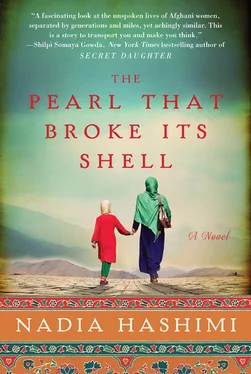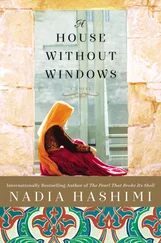“And then he came home one day looking like he’d just met Shaitan himself. His eyes were dark and serious and he sat around staring at the walls, muttering something about atoning for his sins, begging forgiveness of God. He announced that he was going to bring home a second wife since I haven’t been able to bear him a child. There was nothing I could say to that, especially when I saw the look on his face. His family had spoken to him about the idea months ago but he hadn’t seemed all that eager. But I thought… well, when he said he would bring a second wife I wondered if he was crazy enough to think he could bring her here, but then it was… you.”
Shekiba kept her eyes on the ground. Her head spun. Benafsha had not turned him away. She had loved him, enough to protect him with her own life. How could a woman love any man so much?
Because of Benafsha, Aasif had saved her life. For that, Shekiba was grateful.
Iwas a little girl and then I wasn’t.
I was a bacha posh and then I wasn’t.
I was a daughter and then I wasn’t.
I was a mother and then I wasn’t.
Just as soon as I could adjust, things changed. I changed. This last change was the worst.
“Rahima- jan, remember that life has typhoons. They come and turn everything upside down. But you still have to stand up because the next storm may be around the corner.” I hadn’t changed much since I lost my son. Abdul Khaliq had become withdrawn. Bibi Gulalai was more present than before, making sure that the family was carrying itself properly. We had to mourn appropriately or our neighbors would talk. Her narrowed eyes fell on me, checking the color of my chador, the dress I wore and the expression on my face.
When my mind wandered, she caught me and told me to stop staring. She told me to get back to work. I couldn’t expect to just lie around forever. There were still floors to clean. There were clothes to wash. It would be good for me to get back to the routine.
A mourning mother should have been given her forty days to grieve, our visitors were surely thinking. Bibi Gulalai, mother to the most powerful man in our province, knew their concern was driven by fear, not respect, and she did not care.
Khala Shaima summoned the strength to visit me still. Each time she left, I wondered if she would make it home. And I worried that she wouldn’t make it back. I needed her. In a house full of people, I still felt totally alone. There was something on my mind, something I didn’t want to admit to myself or to Jameela. I didn’t know how to feel about it.
“Khala -jan, do you know what the people of Kabul think of us?”
“What are you talking about, Rahima?”
“Kabul is different from here. Just like Bibi Shekiba thought. It’s amazing how many cars, how many people, how many posters. There is so much noise there.”
“What does that have to do with anything?” Khala Shaima looked concerned that I was losing my mind.
“I wonder what those people think of us. They’ve got buildings, banks, taxis, hotels. People from all over the world, construction companies working on new buildings. Beauty parlors and restaurants. Hospitals.”
“You’ve seen a lot of good places in your travels, haven’t you? Seems like you haven’t shared some stories with me!” She smiled wanly.
“And the parliament… sometimes I can hardly believe that so many people could come together in one room. And they talk about things, even some of the women. Sometimes they talk about things people in this village don’t think about in a lifetime.”
“Rahima- jan, what’s on your mind? Did something happen in Kabul?”
“Lots of things happen in Kabul. It is so different from here.”
Khala Shaima looked thoughtful. “Is that a good thing?”
I looked at her. Anything different from here was a very good thing.
“But there’s something else,” I said, my heart heavy with worry.
“There is?”
I nodded.
“What is it?”
I looked away, my eyes starting to tear.
“I see.”
I knew she did. Khala Shaima knew me better than anyone else.
“Well, that’s something to think about then.” She sighed heavily and shook her head.
I’d given it much thought. Thoughts I didn’t care to admit.
People close to death have little to lose. They can think things, say things, do things that others wouldn’t. Khala Shaima and I were both in that position, she because of her health and me because I felt no desire to open my eyes in the morning. A conversation began to take shape between us. A conversation that happened in unspoken words, in false words, in knowing glances. It was difficult to say what we were both thinking but it was something to be explored.
Because, as Khala Shaima had so often said, everyone needs an escape.
Shekiba and Gulnaz kept house together and endured Aasif’s outbreaks, episodes where his frustration got the best of him. He ranted, berated and slapped. He threw things, twice breaking windowpanes. The cost of replacing them sent him into a new rage.
The tension drew the two women together. They shared a husband, they shared blame, they shared punishment. They bickered as well. Shekiba hated Gulnaz’s lofty attitude and her bland cooking. Gulnaz thought Shekiba dull and plain, a lousy conversationalist. But they made the situation work. Shekiba added spices when Gulnaz turned away and Gulnaz talked enough to make up for her husband’s boring second wife.
There were a few months of nervous respite when Gulnaz’s belly began to swell. She told Shekiba when she realized that she had not bled for two months. They wondered on the possibilities until Gulnaz began throwing up once every four days. Shekiba confirmed that these were the signs that a child was growing, as she had learned in the harem. Nothing was said to Aasif, since it was improper to discuss such delicate matters with men, but when he noticed her belly protruding, he smiled with satisfaction and entered Shekiba’s room after dark with renewed zeal.
Aasif came home and shared meals with his wives. They had taken to eating together, the three of them, from time to time. Shekiba was cautious not to join them too often, knowing now that Gulnaz was carrying Aasif’s child he would see Shekiba as an even bigger failure than before.
But Aasif was busy anticipating the birth of his first child. Aasif’s family was quieted, their whisperings that he should take a third wife silenced temporarily. Gulnaz and Shekiba knew that he had been debating the idea but simply could not afford a third wedding and another mouth to feed.
Ramadan came and went. Gulnaz, excused from fasting, glowed with satisfaction as her belly grew large, her cheeks fattened and her breathing grew loud. She huffed walking from the living room to the kitchen. Shekiba had seen many women with child but none had looked as uncomfortable as Gulnaz. It was hard not to notice that she only panted and sighed when she knew Shekiba was around to hear it.
When the pains came, Shekiba hurriedly walked the four blocks to summon the midwife. Gulnaz bit her lip and twisted in agony, her triumphant grin gone for now. Aasif came home and, hearing the midwife coaching Gulnaz through her moans, left again. Hours passed.
The baby finally came, just before Aasif nervously returned to a silent house. The midwife smiled politely and congratulated him as she wrapped her shawl around her shoulders and headed out the front gate. Aasif nodded and walked into Gulnaz’s bedroom. Shekiba pretended not to hear him enter and kept her head over the stove, pouring flour into the hot oil and stirring as it thickened. Litti, the hot flour soup with sugar and walnuts, would help Shahnaz’s womb heal and make her milk come in. Shekiba waited.
Читать дальше












